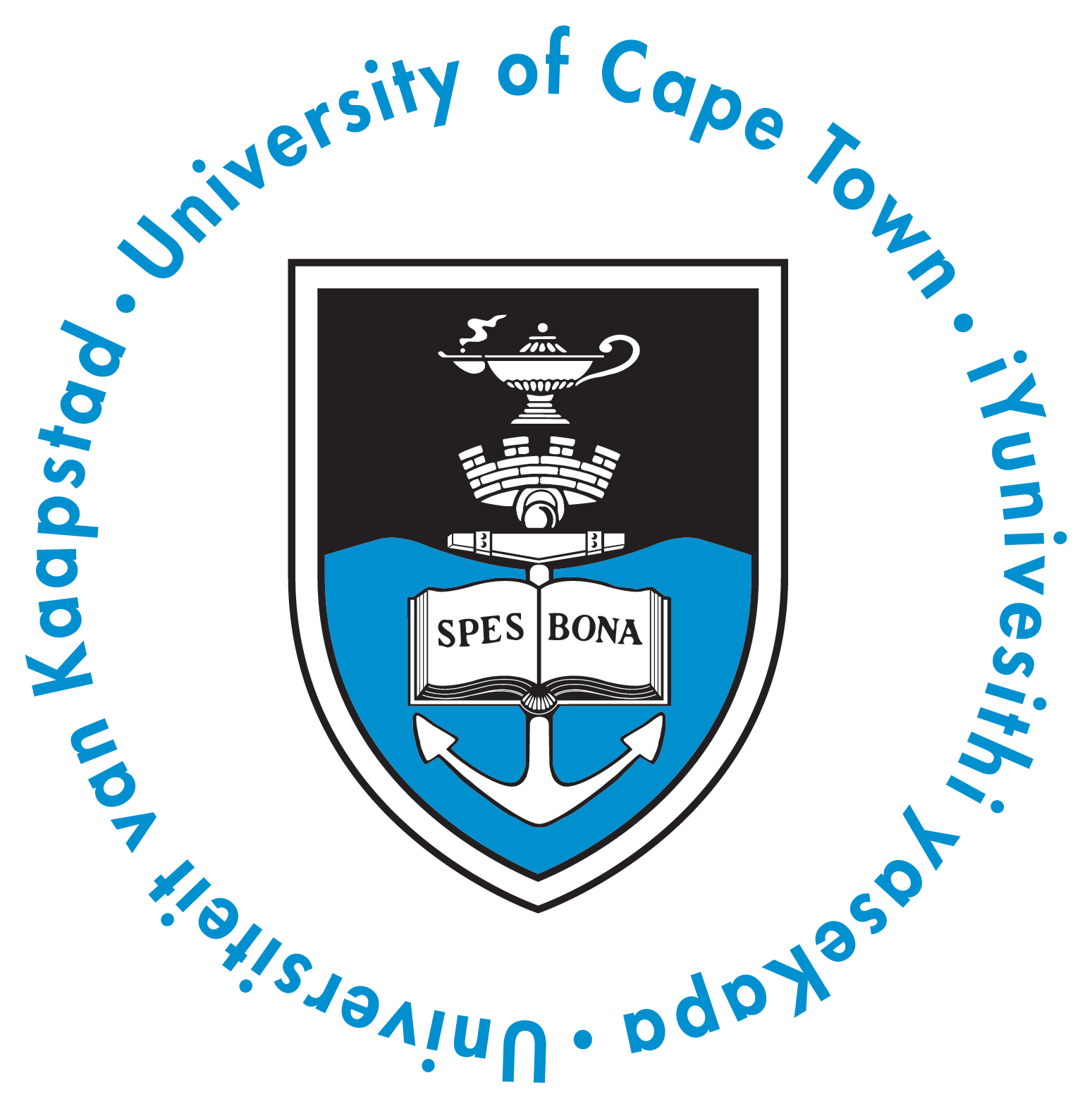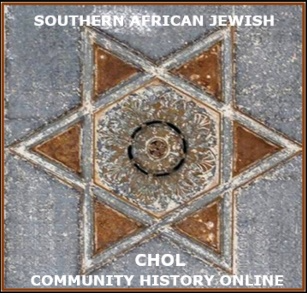
Bellville Jewish families
Benny and Polly Abel
The History of the Premier Bioscope
In 1936, give or take a year, Benny and Polly Abel opened the Premier Bioscope in Voortrekker Road, Bellville. It was built on property owned by the Sianis family from Greece and the Abels rented the premises from them. Benny sadly died in the early 1950's and from then on, his wife, Polly, ran the cinema.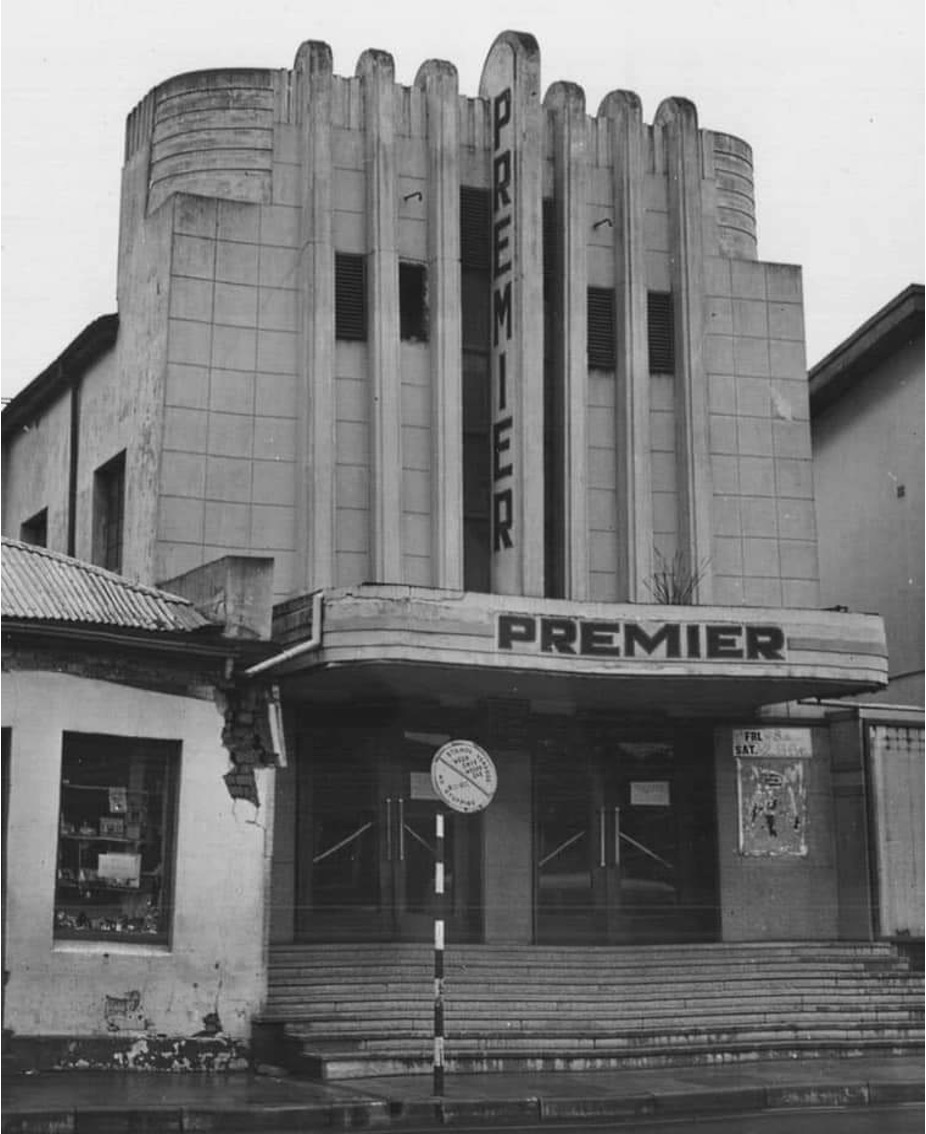
Movies were shown every evening. During the week there were occasional 'double features' which kept attendance up. On weekends there was a 'matinee' on Saturdays when 'ongoing serials' were screened, and comics were swopped amongst the younger generation.
What kept the operation profitable were the adverts, no animations, just stills which came from the film companies. It was possible to obtain a programme printed on a rectangular cardboard page and in this way, book screenings for the entire month.
The price of the tickets for matinees was 8d and for evenings 6s 4d! There were three different seat prices and it was possible to book a permanent seat if requested. These were purchased at a small ticket box-office with railings and a curtain in front, stationed in the centre of the foyer.
Movies were hired from two distribution companies in the city: African Theatres and African Films, both independent businesses. It appears that many of the 'bioscopes' were set up by members of the Jewish community in Cape Town.
The Abels employed two workers: Billy, the projectionist who devoted his life to the place and became a co-manager when Benny died, and Abe, the second worker, who was also devoted to the business, and could be seen wheeling the heavy film reels in a wheelbarrow to the station every two days!! From there, they were sent to Cape Town.
Hazel Abel and her sister, Roslyn, were not allowed to go to the movies as kids and this rule was very strictly observed in the family.
In 1939, it turns out that some British soldiers were stationed in Durbanville and enjoyed the venue at the weekends. It was on such an occasion that Benny noticed a Jewish soldier, from Leeds, whom he invited over to the house in Boston Estate and ever since the families have been in contact.
This story was told by Hazel Geffen (née Abel), daughter of Benny and Polly Abel, who owned and ran the Premier Bioscope, to her friend Gail Lustig (née Loon), while on holiday in Israel.
Nathan Cohen
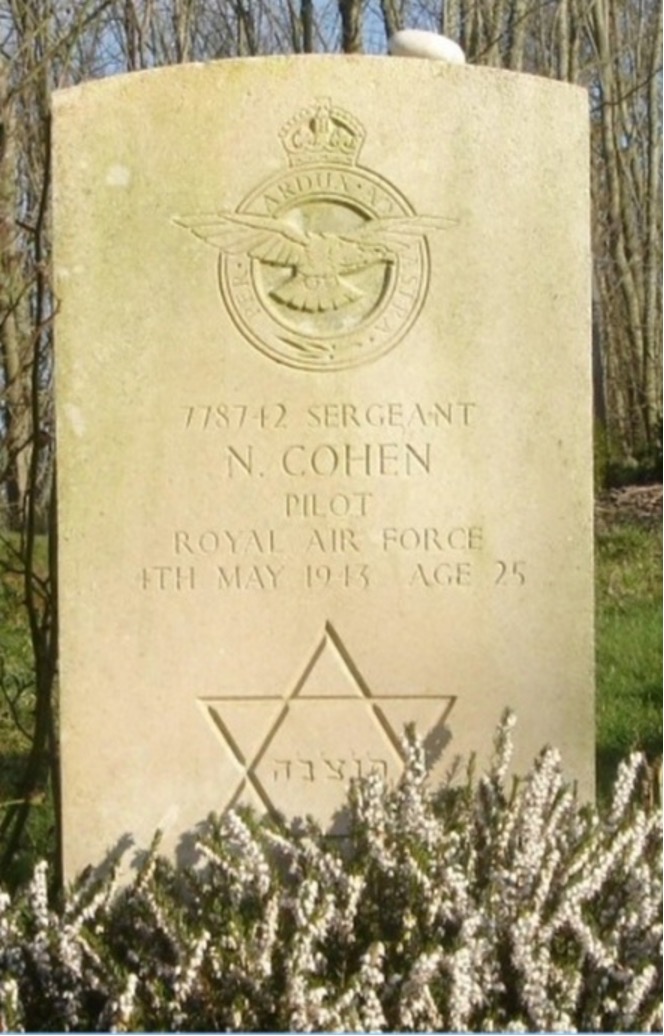
You may remember that there was a plaque of Nathan Cohen in the entrance of the communal hall. He is the only member of the community to have been lost during WWII.
Here is what happened.
Nathan (Natie) Cohen, son of Sete and Zalman Cohen, was a Pilot Sergeant in the RAF Volunteer Reserve with 235 Squadron Coastal Command based in Leuchars in Scotland. He was killed on the 4th May 1943 when his Beaufighter was hit by flak from the flak battery based at Osbrestad, Norway, and crashed into the North Sea. His body was found washed ashore at the beach of Sogard Forstrand on the night of 22nd / 23rd June 1943 by the German Wehrmacht. The next day, the Wehrmacht placed him in a coffin and took it to Lemvig, Denmark, where he was laid to rest in the cemetery, grave 719, on 26th June.
He is commemorated on the Roll of Honour WWII Pinelands No 1 Cemetery, Cape Town.
Notes from his nephew Arnold Conyer as told to Stan Loon, October 1924, and information from various military websites.
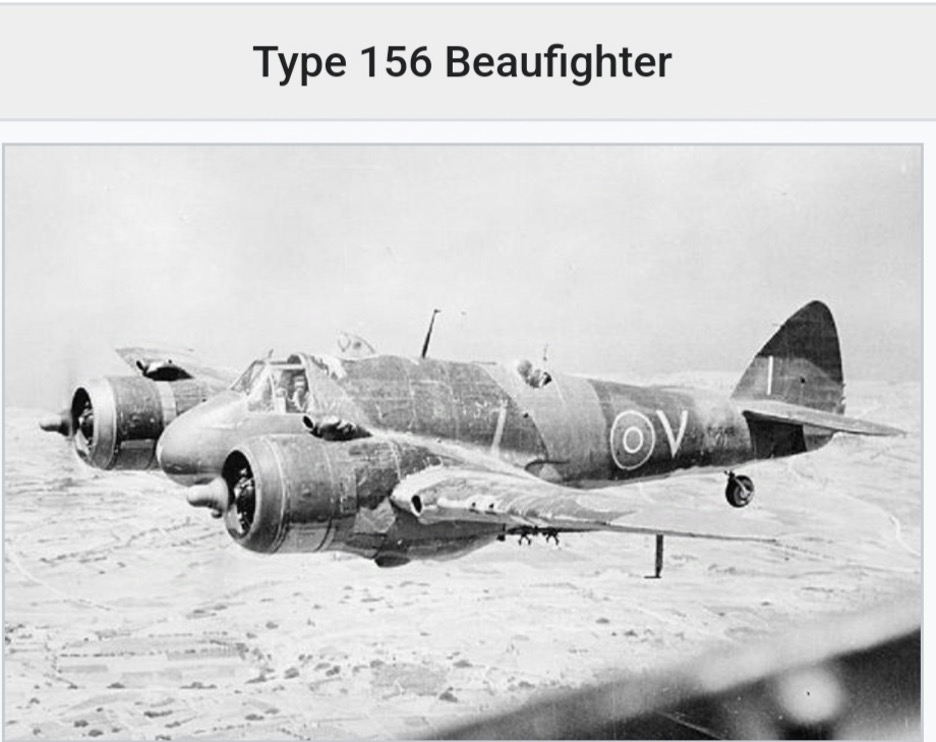
Abe and Anita Imerman
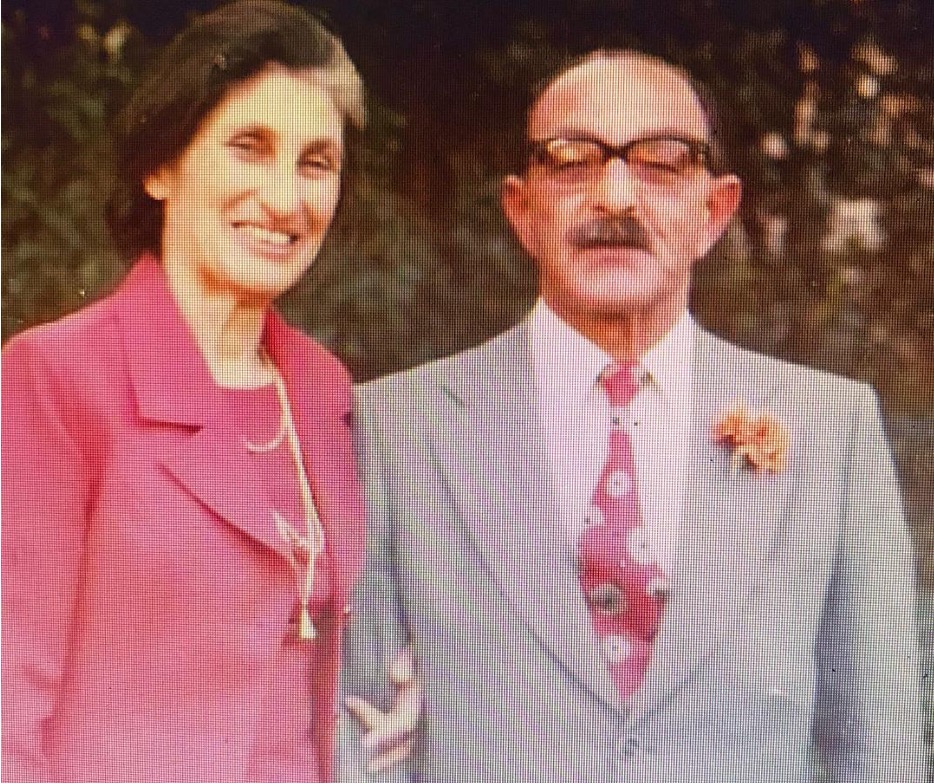
Abe and Anita Imerman lived with their two sons, Michael and Ivan, on the corner of Lincoln Street and 9th Avenue, Bellville. Abe and his business partner owned a farm called Blomtuin Estate where they kept cattle and horses and also made wine. For Rosh Hashanah, he used to get his kids to help make Kosher wine. They had special wooden vats and the grapes were put in big troughs so that they could walk in and squash the grapes, which were then put into the barrels.
Anita used to do a lot of baking for the caterers Emdin & Krofchik. The family used to make their own cheese from farm milk and made many cheese cakes for functions. Anita was also known for her taiglach. She also made the curtains for the Aron Hakodesh as well as Torah covers for the Shul.
Abe was a first cousin of the extraordinary and much-loved blind cantor of Cape Town, Cantor Abraham (Abie) Immerman (with two ms). Known as 'Der Blinde Chazzan' and 'The Man with the Computer Brain', due to his remarkable memory, Cantor Immerman impacted thousands of lives in and around Cape Town during over 60 years of dedicated service. He is described as 'a legend', 'an icon' and 'a truly special man'.
Mary Lubinsky
Our mother, Mary Lubinsky, was widowed at a very young age when her first husband, Jack, passed away. Our sister Anita was just a small baby. As the saying goes - 'when the going gets tough, the tough get going!' Our mother did the best she could despite her changed circumstances.
When Anita was seven years old, in 1952, she married our father, Sam Lubinsky, who, along with his brothers, had been actively involved in the Second World War overseas. After a couple of years, they moved to Bellville where Sam ran a furniture store on Durban Road. Mary lived in Bellville from about 1954 until she passed away in 2000.
Mary was a highly principled lady who always tried to do 'the right thing' where people and circumstances were concerned. She was a caring and kind friend who never hesitated to help when needed. The local synagogue also benefited from her no-nonsense approach to life and strong work ethic as she was actively involved in the Bellville Ladies' Bnoth Zion.
Sam passed away in 1985 and Mary in 2000 after a short illness. May their memory be for a blessing. They will always be missed.
Notes from her daughter Rhona with input from her siblings - as told to Stan Loon, September 2024
There's Something About Mary
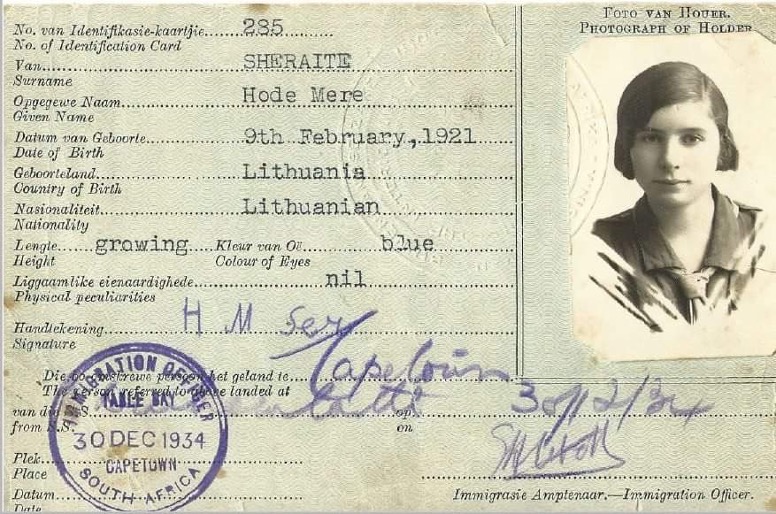
By JUSTIN AMLER
Published: Jerusalem Post, May 1, 2016
About 82 years ago, a small 13 year old girl stood at the Ponevez station in Lithuania, the gentle breeze playing with her hair as the early morning rays of sunshine began to lighten up the surrounding countryside. Holding her suitcase in one hand, and her younger brother's hand in the other, she was about to embark on a journey that would change the course of history, a journey that would forever change her world, her universe and her life. As she stepped onto the train, she was saying goodbye to the only world she ever knew, saying goodbye to the only life she had ever lived, and saying goodbye to the only place she had ever called home.
That little girl was Mary, my grandmother, or Hode Mere Sheraite, as written on her ID card in 1934 and the decision that day began a migration that changed the direction of a life that had been lived for hundreds of years and significantly altered my own private universe, because if she didn't board the train that cool winter's morning, if she turned back and refused to leave, desperate to cling onto the known rather than march into the unknown, I and all my family wouldn't be here today. In 1934, the world was a different place. Hitler had achieved complete and absolute power in Germany a few months earlier and his dark shadow of evil was beginning spread rapidly. It is probably fair to say that panic had not yet gripped the Jews of Europe, but concern was definitely on the rise. However, this was not new and Jews had and always had been under threat at some time or other. Pogroms were commonplace and tens of thousands of Jews had been killed in them, some of the worst having taken place been 1918 and 1920 in Belarus and Poland. These were not just wild-eyed uncontrolled savages on the loose who committed them - many of the pogroms were actively sponsored, organised and supported by local officials. State sanctioned murder.
My great-grandfather, Mary's dad, had seen what was happening to the Jews in Europe and knew that the safety that they might have felt at times was merely an illusion, a mirage easily dispersed. So he decided with incredible foresight that to guarantee the safety and the future of his family, they'd have to leave Lithuania. He had made his way to South Africa a year earlier where he began to work, earning money which he would send back to his family in Lithuania in order for them to buy passage to South Africa. My grandmother and her little brother were the first to go, followed by the rest of her siblings and my great-grandmother over the next few years.
But sadly, the rest of her family, her aunts and uncles and cousins, either could not or would not make the journey out of Lithuania. Their fate was sealed when the Nazis marched into Lithuania in June 1941 and with their Lithuanian collaborators, led them to forests from where they did not return, succeeding in eliminating over 95% of the pre-war Lithuanian Jewish population of 210000 Jews - the highest casualty rate of any Jewish community in the Holocaust.
I later heard about two teenage cousins of hers who had been away at some kind of Jewish youth camp when the Nazis had marched into Ponevez. On their return, they found their home empty and their family gone. Making their way on foot, including being hidden by people who were sympathetic to them, they were able to escape Europe, eventually arriving in pre-independence Israel.
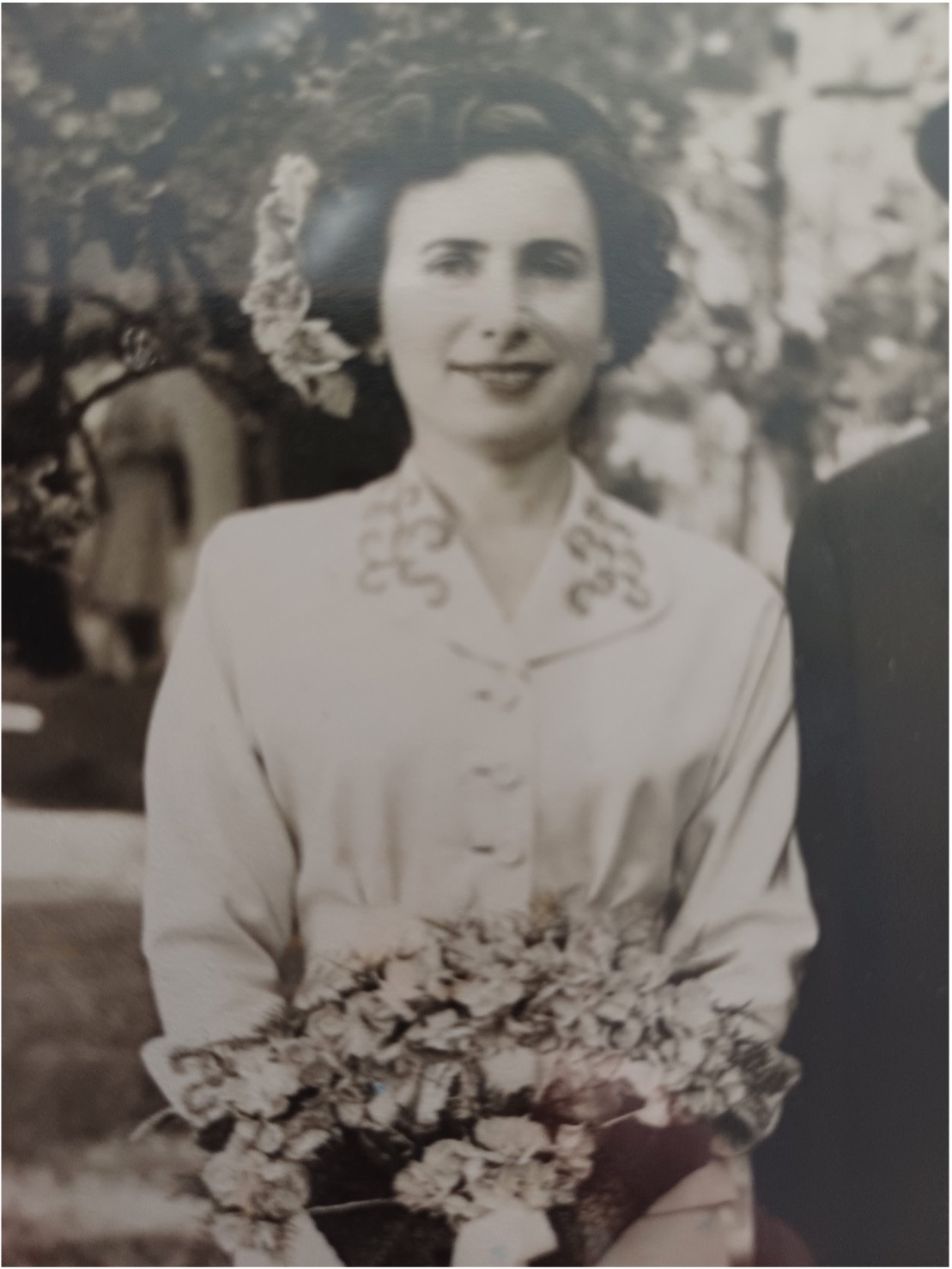
My granny Mary died in the year 2000 and I had only ever known her as my gran, but as I've learnt more about her story, and seen her papers, her ticket, her passport, her postcards in Yiddish, I now have a very different image of her. I have one of a 13 year old girl, standing at a railway station in Lithuania waiting to board a train that would take her on a journey leaving Europe, then onto England and eventually boarding a ship to South Africa. Was she scared? Was she nervous? Was she excited?
I know that she never left because she didn't like the weather, or the economic conditions, or the food. She left because her parents had the foresight to know that the future did not lie in what had been her family's home for hundreds of years. She left because her very survival meant she could not stay where she was.
People sometimes think that evil and the persecution of the Jews began with Hitler, but Hitler didn't bring evil to Europe. It was already there. He merely manipulated it, caressed it, allowed it to grow... to simmer... playing on people's prejudices and tapping into the darkest crevices of men's hearts, building up the hatred then releasing it so that it swept through the continent like a plague wiping out its inhabitants. He gave the oldest hatred the support of a fully industrialized nation with devastating results.
Soon, as the last remaining survivors of the Holocaust pass from this earth to the eternal peaceful resting place they so deserve, the forests around Ponevez and Lithuania and all of Europe will remain as the only living but silent witnesses to the darkest era in both Jewish and human history.
There's something about that sadness and that loss that will never leave us, genetically stamped on our soul so that we never forget, but there's also something about Mary, a woman who did not share the fate of so many others. A woman who was able to change the direction of a path destined only for darkness. A woman who lived when so many did not.
When my gran stepped onto the dock in Cape Town, South Africa on December 30th, 1934 she would not have realized then, but that courageous step she took saved not only my mother's life, but her sisters and her brother and their children who live on today.
And she also saved my life and my children and with it, the entire Jewish nation.
A story by her grandson Justin Amler, that first appeared in the Jerusalem Post in 2015
The Story of Sam Perch
By Stan Loon
By 1920, when the whole of Eastern Europe was being involved in revolution and counter-revolution, the Jews were helpless victims of pogroms and other atrocities.
When the stories infiltrated into South Africa, a Capetonian, Isaac Ochberg, was deeply concerned about the hundreds of parentless children who were known to be wandering around, even hiding in the forests and foraging in every conceivable place for anything they could find to eat.
He therefore approached the Government for permission to bring as many Jewish orphans as he could gather in Eastern Europe to South Africa. After many protracted consultations, the Smuts Government finally granted permission to bring 200 Jewish orphans to South Africa on the condition that the entire Jewish community made themselves responsible for the project and that at no time would these children become a burden to the State.
Ochberg went to Poland and during June and July 1921, he moved from one devastated village to another, picking up homeless children and took them to special depots where he had people waiting to take care of the children. Most of the children were in a shocking state, starving, clad in rags and verminous. Many were ill from the trauma of the horrible experiences which they had had, and many were still in shock from seeing their parents murdered or having to watch their mothers being raped.
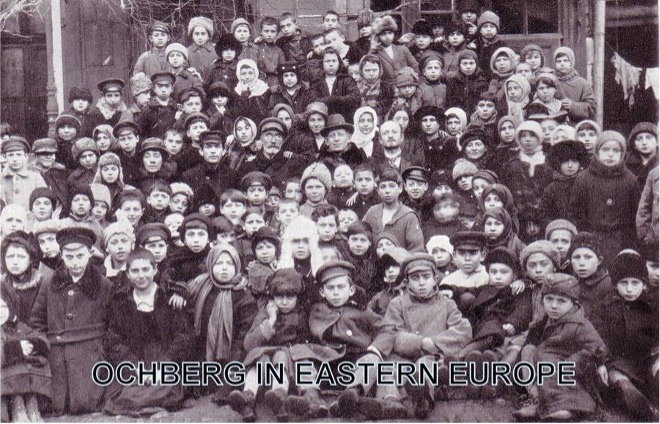
In the picture "Daddy Ochberg", Isaac Ochberg (centre), with his rescued orphans in 1921 in Eastern Europe before leaving for South Africa.
By August 1, he had gathered together as many as he could, and then came the tragic and heartbreaking task of having to select those who could be taken and those to be left behind. Having performed his grim task, he left Warsaw with the 200 selected children and made his way with them to Danzig. A boat he had chartered then took them to London and from there they boarded the Edinburgh Castle to Cape Town, where they arrived on 19th September 1921. Hundreds of weeping, cheering people greeted these wretched refugees when the ship docked.
100 of the orphans went to the Oranjia orphanage in Hope Street, Cape Town, and 100 went to the Arcadia orphanage in Johannesburg. Two of the orphans who went to Oranjia were brothers, Yser and Szepsel Perechodnik, who came from Pinsk, then Poland and now Belarus. Their names were anglicized to Oscar and Samson Perch. Sam was about 7 years old.
About 1928, Sam left the orphanage and went to the Transkei, where he worked at a trade store. He must have stayed there for some time for when he came back to Cape Town, he was fluent in Xhosa. Oscar and Sam went to Riebeek West where they started a general dealer business called Perch Brothers. Riebeek West was the hometown of Jan Smuts and the store was originally owned by the Smuts family.
Later, Sam returned to Cape Town and built a small building which was the start of Central Stores on the Old Paarl Road in Kraaifontein. In 1946, he married and settled down with his wife, Bella, in Boston Estate, Bellville. They had 2 children, Elian and Ivan. In Kraaifontein, he served on the local council and served two terms as mayor there. He was a public speaker of note and many times at ceremonies in Bellville, he was called to propose toasts at weddings, celebrations and other functions.
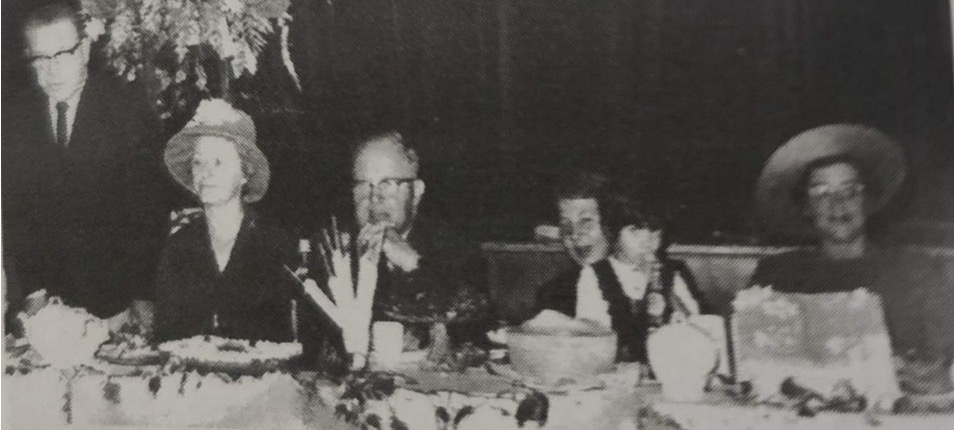
In this picture we see Rabbi Zucker and his wife, Queenie Zucker, and Sam and Bella Perch (with their son Ivan in between them with an unidentified child).
In 1969, tragedy struck when Bella passed away from parasitic cystic disease of the brain. She was 45. Sam went into deep depression and for the first and only time told his sons about the terrible pogroms he lived through in Poland and losing both his parents to starvation. His health deteriorated and he died in August 1974.
I went to a lecture on the Ochberg orphans. I learned that my great aunt was an Ochberg orphan. She married my grandmother's brother. Another brother adopted another orphan who paid the ultimate price in Tobruk in June 1942. The day after the lecture I ordered the book The Ochberg Orphans and the Horrors from Whence They Came, by David Solly Sandler*. When the book came, I turned immediately to the chapter of my great aunt. I was stunned to see, on the page before, a picture of the Perches with Rabbi and Queenie Zucker. It is from here that the story of Samson Perch written by his son Ivan came. MHDSRIP
* See the list of David Solly Sandler's books and how to get them
More about Isaac Ochberg, born near Kiev, who came to Cape Town:
Ochberg Memorial Park Israel
Another reference book: THIS WAS A MAN, by Bertha I Epstein, Isaac Ochberg's daughter
Ronald Pilowski (b. 1943, d. 2021)
Regarded as a legend by everyone in Western Province Cricket, Ronnie Pilowski umpired for 6 decades, mainly at club level, and coached many aspiring umpires. His last match was on 7 March 2020 between Northerns Goodwood CC and Tygerberg CC. One of the world's top umpires, DF Malan High School old boy Marais Erasmus, umpired the game with him.
Ronnie passed away just over a year later. In paying tribute, the Western Province Cricket Umpires Association thanked him for the life changing impact he had on so many umpiring careers, ending with RIP "Showtime".
Phyllis Ruskin – Special Personality
By Gail Loon-Lustig
The twelve miles that separated us from Cape Town felt like much more. Growing up as an English speaker in Bellville, attending English-speaking schools, being Jewish, were issues that seemed minor compared to the major issues that the Apartheid era heralded.
Finding Phyllis's drama classes must be credited to my mother, who had a way of finding 'other things' to do for us. Phyllis and husband, Rodney, and a host of small kids, each one blonder than the next, Cindy, Susan, Karen and Morris, lived in a house in Boston Estate.
Phyllis had studied Drama and English in Cape Town and was passionate about teaching it to kids. She converted the basement of their home into a studio with cushions for sitting arranged in a circle around the room. A small group of us, different ages, boys and girls, would gather there once a week for lessons. Suddenly Phyllis would appear at the top of the stairs that led into the basement, making her entrance, a broad smile on her face, books with ear-marked pages in her hands, often falling on the floor as she walked towards us.
For the next few hours, we'd be transported into a different world of literature, drama and improvisation. We learnt to mime, recite poems, perform plays together and even appeared at Eisteddfods in the Cape Town City Hall. Phyllis inspired me, instilled a confidence in her pupils that felt like magic. Her voice projected into every corner of the room and I remember leaving the lessons happy. She was a wonderful personality, full of fun, humour and vision.
After being active in Bellville in the 60s and early 70s, the Ruskin family left for Durbanville, where the family lived before leaving South Africa for the States. I was fortunate to see her again in the eighties with my family when we visited San Francisco. She was ill with advanced cancer at the time and died not too long after.
David Smith remembers... OUR GANG
Were you in ‘our gang’ in the 1940s to 1960s?
- Rosalind Abel
- Jeffrey Barron
- Daphne Caplan
- Myrna Caplan
- Mel Cohen
- Nan Cohen
- Ralph Cohen
- Syd Cohen
- Don Faclier
- Gil Faclier
- Paul Friedberg
- David Gad
- Bernard Grevler
- Muriel Hill
- Monty Hilkowitz
- Harold Hollander
- Valerie Hollander
- Morris Leiserowitz
- Jackie Lewin
- Selwyn Lissack
- Riva Marcus
- Jackie Marks
- Benchke Miller
- Jessie Miller
- Carol Newman
- Nathan Politsky
- Ronnie Pilowsky
- Gillian Robinson
- Bernard Sacks
- Beulah Sacks
- Bonnie Sergeant
- David Smith
- Myles Tanchel
- Searle Tanchel
- Miriam Wapnick
- Gerald Webner
- Eugene Weinberg
- Helen Weinberg
- John Weinberg
- Natalie Zolty
>>> YOUNGER
- Peter Barron
- Arnold Conyer
- Natalie Conyer
- Peter Friedberg
- Leslie Glickman
- Margaret Grevler
- Derek Marks
- Elion Perch
- Ivan Perch
- Steven Sacks
- Paul Salkinder
- Michael Schneider
- Peter Schneider
- Derek Zolty
OLDER >>>
- Hazel Abel
- Joe Berelowitz
- Lorna Chapeikin
- Selwyn Chapeikin
- Louis Gad
- Max Gad
- Steven Jawitz
- Avron Kaplan
- Leslie Leiserowitz
- Shirley Leiserowitz
- Mokkie Miller
- Arlene Nitsun
- Jackie Rabinowitz
- Raymond Sive
- Mervyn Smith
- Natie Wapnick
- Helen Webner
- Temma Weinberg
- Necia Zolty
MUCH OLDER >>>>
- Chookie Jawitz
- Yehuda Kaplan
- Izzy Polowsky
- Benny Rabinowitz
- Dennis Ruskin
- Rodney Ruskin
- Theo Spiro
MUCH MUCH OLDER >>>>>
- Izzy Anstey
- Norman Spiro

